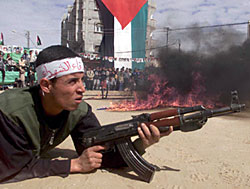
|
||||||||||||||
Learning from experienceThe tank, the checkpoint and the settlement -- Are these now the targets of the Palestinian resistance? Graham Usher spoke to Palestinian leaders and militants in Gaza and the West Bank
On 14 February a Merkava tank rolled into position on the outskirts of Gaza's Netzarim settlement, and was ripped apart by an 80- kilo roadside charge. Two days later a Palestinian, strapped with explosives, detonated himself in a mall in Karnei Shomron settlement, near Nablus. And on 18 February three Palestinian guerrillas descended on an army checkpoint west of Ramallah, and shot dead six Israeli soldiers. These three attacks, by different Palestinian factions, claimed 11 Israeli lives but there was not a civilian among them (Palestinians do not view settlers as civilians). Is this evidence of a decision by the Palestinian resistance to target the occupation rather than Israel? "It's not a decision," says Hussam Khader, a Fatah leader from Nablus' Balata refugee camp. "But it is a trend, and a healthy one." Khader has long argued against targeting civilians inside Israel, "no matter what the Israeli crimes against our civilians." But he does support armed resistance against soldiers and settlers in the West Bank and Gaza. These "create divisions in Israeli society," he says, and weaken the "consensus of fear" Ariel Sharon had, until recently, managed to marshal behind his military policies for crushing the Intifada. The divisions are becoming clearer as the violence soars in the occupied territories. In recent weeks right-wing leaders and settler groups have called for the destruction of the Palestinian Authority, the reoccupation of Palestinian areas and wholesale "transfer" of Palestinians. On the left -- and over the same period -- over 270 reservist soldiers have refused to serve in the occupied territories for the "peace of the settlements;" the "peace camp" has taken to the streets; and 1,000 retired army generals and officers have called on the Israeli government to withdraw from all of Gaza and most of the West Bank as a prelude to final status negotiations with the Palestinians. The polarisation is more remarkable given that Israelis and Palestinians have just lived through a month in which 70 Palestinians and 26 Israelis have been killed, the bloodiest of the uprising. And it suggests -- says a veteran Israeli peace activist -- that some Israelis are beginning to view the 1967 Green Line not only as a "territorial" border but also as a "moral" border. Attacks on the Israeli side of the line are seen as "terrorism," he says. Attacks on the Palestinian side are seen as "resistance." Do the Palestinian fighters share this demarcation? Jamal Abu Samhandana is a military leader of the Popular Resistance Committees, a cross-factional militia in Gaza and responsible for the roadside bomb that blew away the Merkava tank. He says attacks across the Green Line are legitimate. "By attacking civilians inside Israel we force the army to reduce its armed presence around the settlements in Gaza and the West Bank to protect civilians inside Israel. We stretch the army's resources. They also cause insecurity to all Israelis, not just soldiers and settlers." But the Palestinian political leaders increasingly disagree. These include the Islamists, for whom, doctrinally, the "1948 lands" are no less occupied than the "1967 lands." Ismail Abu Shanab is a Hamas political leader in Gaza. "I think we should concentrate our resistance on military targets," he says. "By attacking the tank, checkpoint and settlement you show that Israel has no military solution for the Intifada and that the Palestinians are determined to force it to withdraw." But he agrees with Khader there are no directives from above orchestrating the new military turn. "It is a practical response to Israeli actions on the ground. First Israel used tanks to conquer Palestinian lands, because it thought the tank was immune. But we've learned how to blow up tanks. Then it built fences around the settlements. But we have learned to breach the fences. Then they put up checkpoints. Now we're attacking the checkpoints. Each Israeli challenge is met by a Palestinian challenge." In this Abu Shanab sees parallels with Hizbullah's long war to liberate south Lebanon. It, too, started out with suicide bombers but gradually evolved into the most effective guerrilla force Israel has ever faced. Is the Palestinian resistance evolving the same way? "I think the Palestinians are still mainly reacting to Israeli aggression," says Khader. "But they are developing the resistance. The traditional Palestinian leadership never learned from experience. The younger leadership in the uprising is showing that it can learn from experience. And that is a very positive development."
© Copyright Al-Ahram Weekly. All rights reserved
|
|
|
Home [sign the petition] [summary of events] [Biography] [Statements] [Documents] [Recent Developments] [Press Release] [Related Articles] [Guestbook] [Photos] [Links] [other Languages] Arabic Contact Us info@hussamkhader.com |
